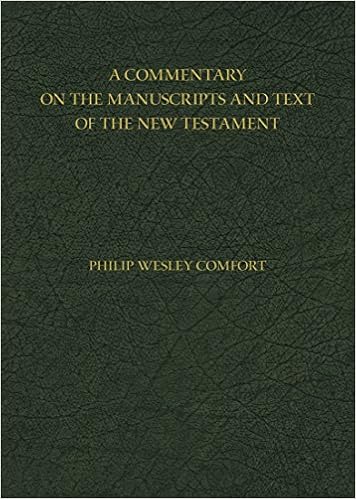
A Commentary on the
Manuscripts and Text of the New Testament by Philip Wesley Comfort
Longtime scholar of ancient biblical manuscripts, Dr.
Comfort has been an authority on textual manuscript traditions for many
years. Here, in this updated edition,
his A Commentary on the Manuscripts and Text of the New Testament is a welcome
addition to the growing field of textual studies. What do you find in such a commentary? For one, Comfort introduces the reader to the
extant papyrus manuscripts we have of the New Testament, namely the Oxyrhynchus
Papyri, the Chester Beatty Papyri, and the Bodmer Papyri. Also, Comfort reasons that the earliest
manuscript evidence is generally followed, “documentary evidence has pride of
place (31).”
One of the most significant sections of the book for me was
Comfort’s elucidation concerning nomina
sacra in the NT. Comfort writes, “The earliest copies of the New Testament
writings (perhaps some of the autographs themselves) included these specially
inscripted forms for the sacred names…some writers and/or scribes used the
first letter and the last letter of the name; others used the first two letters
and the last letter. Thus, for example
XPICTOC (Christ) was written as XP (line over it, very rare form), XPC (line
over it), or XC line over it (the most common form). In whatever form, XPICTOC (Christ) was always
written as a nomen sacrum (37-38).” In
the LXX, the Greek Old Testament, these nomina sacra were not used, the only
similarity is in the divine name of Yahweh (it would often be a Hebrew
contracted form). In some of the very
earliest copies of the NT, we find other words that are deemed nomina sacra,
cross and crucify are some of those examples (stauros and stauromai). One of
the reasons why a bar would be over a significant word, a nomen sacrum, was to
desecularize the term, giving is sacred status (40). Lectors and readers of liturgy would also know
as a result of the nomina sacra where to provide more emphasis when reading a
text, thereby giving it more weight as its heard.
The rest of the text is a careful analysis of the textual
variants and commentary on the textual tradition in the various books of the
NT. Comfort pays careful attention to
the very earliest manuscript and papyri traditions.
This book is a welcome addition to the growing literature on
textual analysis. Comfort helpfully
gives us a background on the text families and the most important things to
look for in textual analysis.
Thanks to Kregel Academic for the copy of this book in
exchange for an honest review.
Comments
Post a Comment